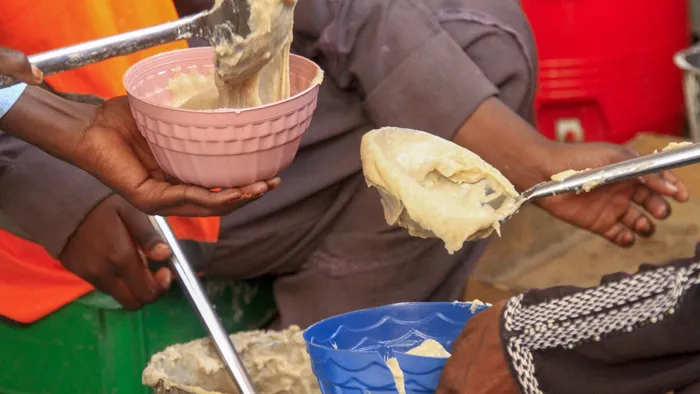AU has no capacity to end the year-long civil war

Volunteers prepare food for internally displaced Muslim devotees for their breaking fast meal during the Islamic holy month of Ramadan in Gedaref on March 13, 2024. Sudan entered its second Ramadan in a row in the throes of a deadly war that has left much of the country gripped by the spectre of famine. More than six million of the country’s 48 million people have been internally displaced by the war, and more than half the population needs humanitarian aid to survive, according to the United Nations. – Picture: AFP
By Sizo Nkala
The Sudanese civil war which broke out in April last year, pitting the Sudanese Armed Forces (SAF) against the Rapid Support Forces (RSF), is still raging unabated. An estimated 14,000 people have been killed – even though this figure is believed to be a conservative estimate. Almost 8 million have been displaced both inside and outside Sudan.
The conflict is also on the verge of precipitating one of the biggest famines in African history, with the World Food Programme (WFP) reporting that almost 18 million people (about 38 percent of the population) face acute food insecurity. This has been attributed to rising food prices, the destruction of infrastructure, the shortage of cash, and declining agricultural production which have drastically reduced food supply.
Due to the fighting, only 6.5 million people, which is about a third of those facing emergency levels of hunger, have been able to get food assistance. According to the UN Children’s Fund (Unicef), about 3.7 million children in Sudan are acutely malnourished, while 730,000 children face severe acute malnutrition which is characterised by severe physical wasting and loss of weight.
The situation will be exacerbated by the collapse of the health-care system as about 80 percent of the hospitals have been forced to close because of the shortage of critical medical supplies.
It also doesn’t help that the UN’s Humanitarian Response Plan for Sudan is woefully underfunded, having managed to get only 4 percent of its target figures. Thus, the UN currently doesn’t have the capacity to mount a humanitarian response that is even remotely proportional to the scale of the crisis in Sudan.
The SAF and RSF forces have been weaponising humanitarian food assistance to advance their war objectives.
The SAF has prevented food assistance from reaching areas that are under the RSF forces and blocked cross-border humanitarian access from Chad to Sudan, while the latter has looted humanitarian food warehouses to sustain its soldiers.
The efforts to bring the warring parties to a peace agreement have been futile thus far. The talks brokered by the US and Saudi Arabia capsized as the RSF and SAF accused each other of negotiating in bad faith.
The regional body, the Intergovernmental Authority on Development (Igad), also failed to make any headway in bringing the parties to the negotiating table.
The SAF refused to attend the talks organised by the Igad in July 2023 because of the regional body’s intention to send a peacekeeping mission to protect the civilian population. The Sudanese government, which is headed by the leaders of the SAF, suspended its membership of Igad in January after the regional body insisted on the immediate cessation of hostilities, and gave the two warring parties a two-week ultimatum to meet face-to-face to negotiate a peace deal.
Recently, the UN Security Council, the African Union and the Arab League called for a ceasefire during the month of Ramadaan. The AU statement calling for a ceasefire reads, “The Sudanese parties to observe a total ceasefire across the whole national territory throughout the holy month of Ramadaan.
“The chairperson recalls that such a ceasefire could help facilitate the dispatch of humanitarian aid to civilian populations in dire need.
“The chairperson urges all the parties to shoulder their responsibilities to prevent the serious risk of famine and other humanitarian catastrophes to befall the Sudanese people and the neighbouring states.”
While the statement from the continental body was welcome, it was not heeded by the RSF and the SAF as fighting has continued two weeks after the beginning of Ramadaan. Thus, just like its numerous previous statements, the latest statement fell on deaf ears. At the AU summit a month ago, the Sudanese conflict did not receive as much attention as it merited.
The AU established the Expanded Mechanism on the Sudan Crisis a few days after the breakout of the civil war.
The mechanism was meant to co-ordinate regional, continental and international efforts to bring peace to Sudan. However, nothing has been achieved thus far. The continental body also established another structure at the beginning of 2024, the AU High Level Panel on Sudan.
The panel is chaired by Mohamed Ibn Chambas, the AU High Representative for Silencing the Guns, and has Specioza Wandira-Kazibwe, former vice president of Uganda, and ambassador Fransisco Madeira, former Special Representative of the chairperson to Somalia, as its members.
The role of the panel is to reach out to different stakeholders in Sudan in a bid to begin dialogue for the peaceful resolution of the conflict.
The resort to ad hoc structures is perhaps an admission that the AU’s official structures, such as the Peace and Security Council, have failed to end the war.
As it is currently constituted, the AU does not have the capacity to halt the Sudanese civil war.
The organisation has neither the legal grounding nor the resources to intervene effectively in Sudan.
It is no surprise that it cannot act to save the Sudanese people from an imminent famine. It is high time that the AU is reformed and given real powers and resources to improve its peace and security infrastructure.
Dr Sizo Nkala is a Research Fellow at the University of Johannesburg’s Centre for Africa-China Studies
Related Topics: